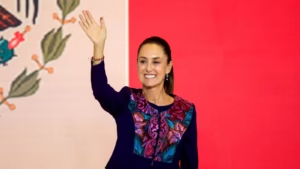 Written by James Fitzpatrick
Written by James Fitzpatrick
We’re sitting in a high-school gymnasium, currently commandeered as an exam hall, with single desks and chairs arranged in neat little lines. Half the chairs are filled by CEOs of Australian businesses and not-for-profits, mentally simulating escape paths through a tough economic and political climate, the other half filled by aspiring politicians, quietly verbalising their election victory and concession speeches. The exam invigilators are the Australian voting public, keeping an eagle (read: suspicious) eye on both cohorts. Toward the back of the hall, a nervous CEO coughs and Bob Katter drops his pencil, it echoes through the till-now deathly silent hall.
The voters-come-exam-invigilators hand out this year’s paper: “How to navigate a cost-of-living crisis during a Federal Election”. The topic should come as no surprise, it’s basically the same as the last exam in 2022. While its exact format varies, this exam paper was first written centuries ago, and has been recently seen nagging the exam halls of your counterparts in other Western democracies, particularly since COVID interrupted lunch time.
While passing notes may be considered “cheating” in other exams, in this one, it holds the secret to success. What’s more, the invigilators won’t evict you for the transgression, as they genuinely just want you to pass the exam and get the economy back on track so they can pay for milk again.
What politicians can learn from CEOs
The Dutton-led Coalition has an obvious strategy option when it comes to the cost-of-living debate; ask voters “are you better off now than four years ago, when we were in charge?” The data is hard to argue with, the economy, and a lot families, are worse off than four years ago. Whether that’s Labor fault or the inevitable outcome of a global economic downturn, is up to you to decide.
Articulating a clear message during a complex economic crisis can be challenging but could Labor and others learn anything from how businesses have a approached a similar problem?
Unlike politicians, businesses spend very little time talking publicly about their competitors. In business marketing theory, brand name recognition is critical, so why would you give a competitor free airtime?
Smart businesses also don’t start any engagement by talking about themselves, instead they focus on the customer; what’s the customer’s story? What are their needs? What is the problem? Only once the need or problem is established does the business propose a solution and then position themselves as the best option to provide said solution.
Given limited attention spans, the above must be articulated in a short, engaging, and simple manner.
During a complex cost-of-living crisis, politicians would do well to watch how businesses focus intently on the customer, acknowledge and empathise with their problem, and articulate simple and direct solutions. While complex economic policy reform has an important role to play, during an election campaign, the offer will need to be refined to what simple financial measures can both parties offer that seemingly provides immediate relief to the household?
A final note passed from the CEOs to the pollies might suggest they consider articulating a clearer point of difference. In the business world, if you can’t demonstrate to your customers how your product is any different (read: better) than others, why should they care to listen? As if ignoring that advice entirely, both major Australian political parties have become more and more alike in recent decades, with differences on policy stances often undetectable. If voters can’t decipher the difference, then when they come to the election grocery store, are we just leaving it “down to luck” as to which party they’ll pluck from the shelves?
What CEOs can learn from politicians
For all their stereotypical flaws, one common strength among politicians is their ability to read the room, at both a micro and macro level. Ever been at an event where a politician walks in and immediately people are drawn to them? With every handshake and execution of small talk, a good politician will make you feel like you’re the centre of their attention, until they move to the next prospective voter. While they carry that required charisma for the job, you can often see their swagger equally weighted by a readiness to receive and politely manage criticism from naysayers.
Politicians expect to be publicly questioned; their every move scrutinised by journalists and everyday voters alike. They rarely respond with obvious resentment, instead opting for well-oiled diplomatic responses that attempt to take the heat out of the confrontation. They know that the manner in how they respond is as important as the original topic of contention in the first place.

Former Woolworths CEO Brad Banducci
As the economy has tightened and families have struggled, the spotlight has moved to big business, like the supermarket giants, who seemingly still turn massive profits. Some business leaders have recoiled at the increased scrutiny, naively thinking they should be beyond question, and have paid the consequences (à la Woolworths former CEO Brad Banducci). In the context of a cost-of-living crisis and Australia’s mixed market economy (i.e. a capitalism x socialism hybrid), business leaders would do well to follow the lead of politicians in this regard; expect scrutiny, empathise with your audience, and take responsibility for how you’re helping support your customers in a time of need.

President of Mexico, Claudia Sheinbaum
A particular example was set recently by politician Claudia Sheinbaum who won Mexico’s election convincingly to become their first female president on a platform of direct and obvious reforms to help combat the cost-of-living (e.g. grocery price caps etc.). Importantly, Sheinbaum’s policy reforms were matched by symbolic gestures, like the selling of her predecessor’s “luxuries” such as the presidential jet; a move that resonated strongly with families who were struggling financially.
Mindful of a CEO’s need to produce a profit for shareholders or balance a budget for their board, what behaviours or gestures would at least demonstrate awareness and empathy for the financial realities of their customers in a cost-of-living crisis?
For CEOs and politicians alike, there is a path that will help you navigate through an election period clouded by a complex economic climate. Conveniently, it’s not an unchartered path, but it will require you to swap notes with your classmates on the most appropriate decision-points along the way, with some careful and considered communication and behaviour.
Given our team’s experience and hawk-eye position, if you need any assistance navigating the challenging government relations path ahead, please do not hesitate to reach out.


